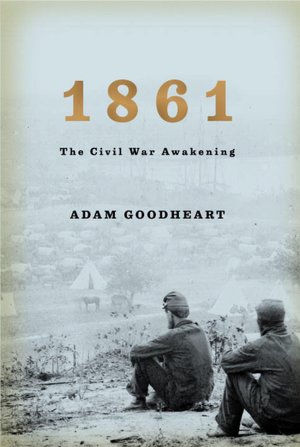My history book club met tonight to discuss 1861: The Civil War Awakening by Adam Goodheart. The discussion led me to the conclusion that the book described the atmosphere in the United States from which emerged the Civil War. In some cases it described in some detail the ideas of especially influential people, while in other cases it dealt with more humble folk. The emergence of the war was largely through a political process, and of course on the part of the Union the most influential person was probably the President.
At least a couple of us were bothered by the author's frequent statements as to what someone thought. Others were bothered because we could not figure out whether the people discussed in more detail were the most influential or whether there were other criteria for the author/s choice. I was concerned that the atmosphere of the south was not as well described as that of the north or west.
There was a fairly vigorous discussion as to whether the Confederacy might have won the war or whether the Union was simply too strong, its military too well led (at least by Grant and Sherman), and its political leadership too great.
Similarly, there was a fairly vigorous discussion as to whether the leadership of South Carolina and Virginia, when they chose to fight, was making a reasonable decision or a very bad decision.
I believe they made very bad decisions. They did so, underestimating the leadership of Lincoln and the policy elite of the Union, underestimating the leadership of the Union military, underestimating the fighting power of the Union (numbers, quality of the troops, and superiority of material), underestimating the economic ability of the Union to support the military effort of its army and navy, overestimating the relative capacities of the Confederacy in all these respects, but especially of the southern economy to work well on the basis of slave labor, overestimating the likelihood of aid for the Confederacy from European powers, and especially failing to understand the nature of the total war that they were about to begin. Someone noted that next month, as we will read about World War I, we will find similar errors made by the political elites.
I suggest that South Carolina and Virginia had limited suffrage to a small part of the population and that the political elite that emerged from the white male voters included many slave holders and plantation owners -- people whose wealth appeared to depend on the continuation of slavery. While there must have been other cultural factors which led them to make the wrong decision, "where you stand depends on where you sit"!
One side discussion looked at the pervasive anti-black racism in both the Union and the Confederacy. People on both sides of the Civil War felt that the slaves could not be merged successfully into the majority white population of the United States. It occurred to me that not only did people on both sides feel that the policy of the founding generation to "civilize" the Indians had failed (and that the Indians were racially superior to the blacks albeit inferior to the whites), but that the older people had experienced in their lifetime the removal of the Indians from east of the Mississippi. Our attitudes toward the racism ranged from incomprehension to revulsion.
There was wide agreement that the book was an easy read, a page turner. However, several people in the group found errors of fact that so offended them that they tuned out the rest of the book.

No comments:
Post a Comment